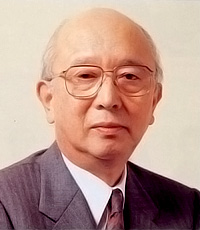Japanese Pioneers
Atsuyoshi Ouchi

Atsuyoshi Ouchi was born in Tokyo in 1919. After graduating from the Faculty of Technology at Tokyo Imperial University in 1942, he went to work for Nippon Electric Company, Limited (later NEC Corporation) in 1942. He became the general manager of the IC design division in 1966, general manager of the IC business division in 1968, and general manager of the VLSI Development Division in 1975. He was promoted to executive vice president in 1980 and vice chairman in 1984. He received the Medal with Blue Ribbon in the same year. Ouchi became the chairman of NEC in 1988 and received the Order of the Sacred Treasure, second class, in 1989.
Nicknamed “Mr. IC” both domestically and internationally, Ouchi has been a prominent figure since the beginning of the IC era. He was a major contributor to taking both NEC and the Japanese IC industry to the top of the industry world-wide.
After being engaged in the development of semiconductor applications and serving in the positions such as the manager of medical electronics within the applied electronics division, he was appointed general manager of the IC design division on the establishment of the IC business group in 1966. He then became general manager of the IC business division in 1968. No other company was using the word “IC” in the name of a business division at the time. Benefiting from the rapidly expanding market for electronic calculators and computers, brought NEC to the forefront of the business more than ever before.
In the MOS memory business, Intel Corporation had built a strong position in the market through pMOS technology. Ouchi’s decision to use high-speed nMOS for competitiveness against Intel’s lead at the time proved to be correct, with nMOS eventually becoming the standard. His dedication to developing the microcomputer business was also exemplified by his great success with the TK-80 microcomputer kit.
Japan upended the dominance of the U.S.A. in the semiconductor market, and this led to trade and technology friction between the two countries. Ouchi was well-known at the time for his vigorous arguments with the U.S. Semiconductor Industry Association (SIA) and other bodies as a leader on the Japanese side.


